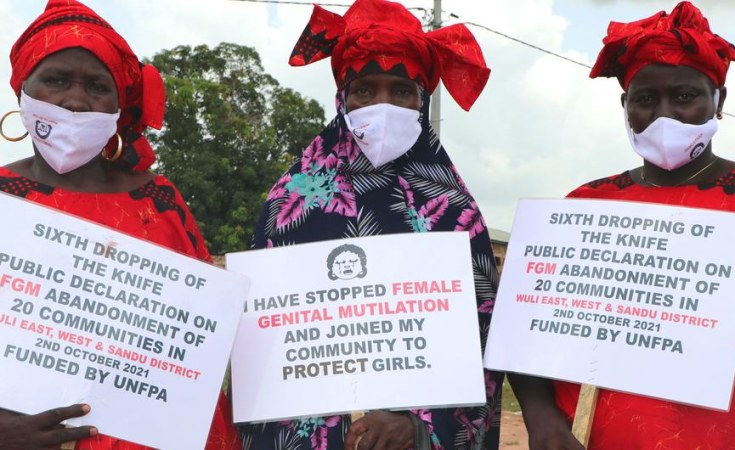Abuja — Reject Proposed Law That Would Reverse Critical Gains for Women's, Girls' Rights
A bill before Gambia's National Assembly to reverse a groundbreaking 2015 ban on female genital mutilation (FGM) jeopardizes the rights of women and girls in the country, Human Rights Watch said today.
Gambia is among the 10 countries with the highest levels of FGM. In addition to the 2015 ban, which made all acts of FGM a criminal offense, the Gambian government adopted a national strategy and policy for 2022-2026 to end the practice in the country by 2030. If the National Assembly adopts the Women's (Amendment) Bill 2024 at its June session, Gambia would become the first country to overturn a FGM ban.
"The Gambian government's consideration of a bill reversing the ban on FGM is deeply troubling for women's rights," said Mausi Segun, Africa director at Human Rights Watch. "The proposed law would legitimize FGM in the country and could encourage similar measures elsewhere on the continent, undermining the progress made in protecting girls and women from this harmful practice."
Female genital mutilation refers to "all procedures involving partial or total removal of the female external genitalia or other injury to the female genital organs for non-medical reasons," according to the United Nations International Children's Fund (UNICEF). It has lasting physical, psychological, and emotional consequences. It is also a serious public health issue and can lead to complications during childbirth, including maternal and infant mortality.
FGM violates girls' and women's rights to health, security and physical integrity, rights to be free from torture and cruel, inhuman or degrading treatment, rights to life, and rights to sexual and reproductive health.
The UN reported that over 230 million girls and women worldwide have survived FGM and live with its lasting effects. UNICEF found that approximately 73 percent of girls and women in Gambia ages 15 to 49 years reported surviving FGM, with more than 80 percent of those ages 10 to 19 having been cut before age 5. More than 20 percent of them were infibulated, meaning the genital area is cut and sown shut.
Traditional practitioners, many of them women, perform most cases of FGM in Gambia, leading to deaths in some cases as well as short-term and long-term morbidity in many more instances. While medicalization of FGM or reinfibulation, meaning the genital area is cut back open after previously being sown shut, performed by any category of healthcare provider, might slightly mitigate immediate complications, FGM is never "safe." Girls and women face a high risk of health consequences immediately and later in life. According to the World Health Organization (WHO), there is no medical justification for the practice.
The 2019-2020 Gambia Demographic and Health Survey data showed a slight decrease in FGM, 73 percent of girls and women ages 15 to 49 having survived FGM compared with 75 percent in 2013. The survey also reflected a shift in the attitudes and behaviors of many practicing communities. However, over the last 30 years, the percentage of girls and women ages 10 to 19 who reported experiencing FGM has not changed significantly.
Most communities in Gambia use religion or tradition to justify the practice. However, there is no requirement in Sharia (Islamic law) for FGM, or female circumcision, nor is it a part of the Sunna (Prophetic traditions) or considered an honorable act. It contradicts the prophetic hadith, Muhammad's words, "Do not harm yourself or others." The common definition that circumcision is the cutting or removal of "extra skin" is not applicable because there is no unnecessary part of a female's external genitalia that could be useless or harmful.
The Office of the United Nations High Commissioner for Human Rights defines harmful practices as "practices which constitute a denial of the dignity and/or the integrity of an individual, result in physical, psychological, economic and social harm and/or violence and limit women's and girl's capacity to participate fully in society." It says that such practices, including those based on tradition, custom, or religion, are a violation of human rights.
FGM is addressed in a number of international conventions and regional agreements and is prohibited by national legislation in many countries. The international community and UN member countries have committed to eliminating all harmful practices, including FGM, by 2030 as part of the Sustainable Development Goal on gender equality. With Gambia's current FGM trends, reversing the ban would inevitably maintain and possibly increase its high levels of FGM, endangering the lives and well-being of Gambian girls and women now and in the future.
The Gambian government should prioritize the protection of girls' and women's rights and adopt all measures to eliminate this harmful practice by 2030, Human Rights Watch said. The government should heed calls from civil society organizations and African and UN human rights bodies to discourage legislative efforts to lift the ban.
It should urgently invest in comprehensive education and awareness-raising programs to promote understanding of the harmful effects of FGM, encourage community-led efforts to end the practice, strengthen enforcement mechanisms to ensure compliance, and provide survivor-responsive medical, legal, and psychosocial support. International donors should immediately coordinate with national and local efforts to advocate for upholding the FGM ban.
"The Gambian government should fiercely protect the rights of Gambian girls and women and reject any proposal to reverse or weaken the 2015 FGM ban," Segun said. "The government should take concrete steps to end the harmful practice of FGM once and for all."


